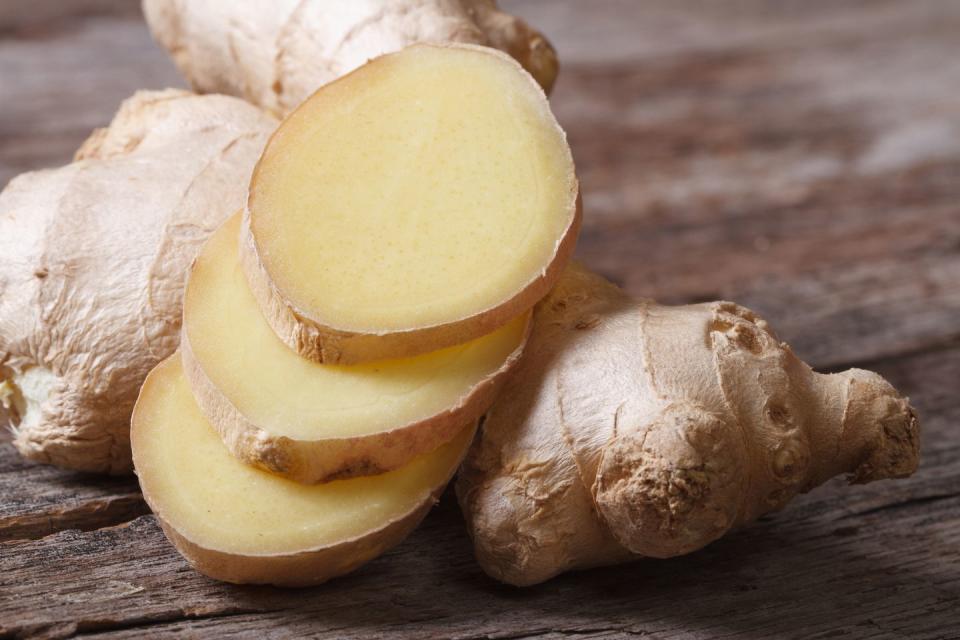Ginger Can Absolutely Help Settle an Upset Stomach, Research Says

People have dug up Zingiber officinale, a.k.a. the root more commonly known as ginger, for its health benefits and spicy flavor since the beginning of time (Fun fact: It's actually in the same family as turmeric, another powerful good-for-you ingredient). But just because it's been around awhile doesn't mean it's a cure-all for your health. Ginger should be used in addition to a healthy diet, exercise, and regular visits to your doctor.
The potential health benefits of ginger:
It can support your immune system.
You know that spicy, pungent scent-flavor that's ginger's calling card? That's due to gingerol, a compound that has antioxidant properties to help support your immunity. Try sipping ginger tea or making a gingery salad dressing for a quickie health boost.
It can reduce your risk of diabetes.
Diabetes is a huge problem in this country, with 10.5 percent of us afflicted in 2018. What's more, Black Americans, Native Americans and Alaskan Natives suffer from the disease at a higher than average rate, according to the American Diabetes Association. Scientists have linked some active compounds in ginger with improvements in insulin and metabolism. That said, if you're at risk for diabetes, adding extra to sugary gingerbread cookies won't do you any favors! Keep both dried and fresh ginger on-hand for flavoring smoothies and veggie-based stir-frys and soups. While some chemical compounds in ginger may decrease over time, the drying process enhances other beneficial ones.
It's a natural way to relieve period pain.
Out of all of the research done on ginger's pain-relieving properties, results show it helps with menstrual pain the most. Sipping ginger tea can also soothe nausea during that time of the month. However, if you usually take acetaminophen or ibuprofen, it may not work as well. Check with your doc before trying any supplement in extract or pill form, since it may interact with other medications you're taking.
It's an anti-inflammatory.
Like other produce, nuts, seeds, beans, and whole grains, ginger contains antioxidant-like compounds called phytonutrients that may reduce cell damage. The root can also prevent inflammation from starting by reducing cell-signaling activity. With that in mind, adding ginger to already good-for-you, nutrient-dense meals is the key to unlocking those properties.
It can settle an upset stomach.
The idea that ginger can help with some light tummy trouble isn't new. In fact, research has linked multiple digestive benefits to ginger, specifically acting on parts of your GI tract responsible for feelings of nausea, stomach upset, and vomiting. It may also help move food from the stomach to the small intestine for digestion and absorption. That said, ginger cannot prevent food poisoning or counteract ingestion of a harmful substance, so contact your physician ASAP if something requires urgent medical attention.
It can also curb morning sickness.
And speaking of an upset stomach, pregnant women in particular should take note: Ginger may help reduce symptoms of morning sickness! In fact, research supports the safety and efficacy of ginger during pregnancy, with some improvement in symptoms when compared to a placebo. One 2018 study found that moms-to-be who consumed 1g of fresh ginger root per day for four days experienced a significant decrease in nausea and vomiting and no risk for the mother or her future baby.”

It may help prevent heart disease.
The same anti-inflammatory compounds in ginger can also reduce the risk of chronic disease. A 2019 review found that ginger can lower blood pressure and decrease blood lipids (fats) levels, both of which help protect against heart disease, and a 2016 review linked regular ginger intake with lower cholesterol and blood sugar compared to a placebo. But just like diabetes, eating ginger can't offset an otherwise poor diet high in saturated fat and added sugar. You'll still have to consume more veggies, 100% whole grains, lean proteins, fish, legumes, and beans in order to reduce your risk.
It may lower your risk of cancer.
The cell-protecting properties of ginger can lower the long-term risk of certain cancers. That's because the spice and other flavorings may reduce cellular activity that causes DNA changes, cell death, and proliferation of cancer cells. It could also help sensitize tumors to treatments like chemo and radiation. While ginger's not a cure-all for any chronic disease, using it regularly with loads of other spices and plant-based foods can help benefit health overall.
It can help you lose weight.
Some small studies have linked ginger intake — when combined with other plant extracts — to some benefits in weight loss. And there's definitely some promising animal research linking ginger to weight management. But as with anything else, ginger is no magic weight-loss pill! Other components of a healthy, balanced diet matter just as much when it comes to losing weight and keeping it off.
The bottom line: Ginger is a delicious way to flavor any anti-inflammatory diet plan, and good news—it can last up to three weeks in the fridge unpeeled and even longer in the freezer either peeled or unpeeled (pro tip: to make it last even longer, puree it with a little water, pour into ice cube trays and freeze, then throw a ginger cube into everything from stir frys to soups!). Plus, swapping the spice for added salt, sugar, or saturated fat may help us lose unwanted pounds! Use ginger for seasoning veggie-heavy meals and snacks, not solely for health benefits.
You Might Also Like

